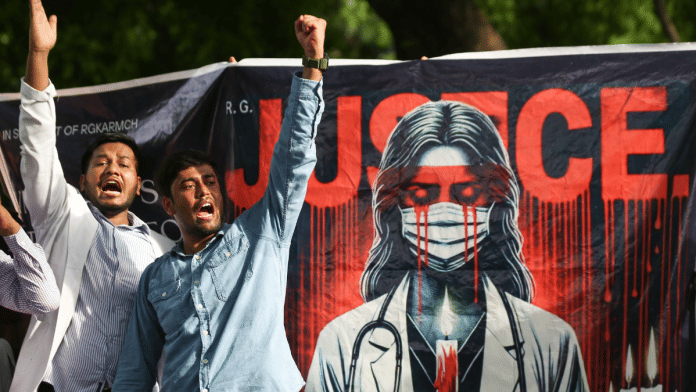New Delhi: The RG Kar Hospital rape-cum-murder is a reflection of a “systemic institutional failure” and raises questions “regarding safety of healthcare professionals” in hospitals, the Supreme Court observed Tuesday.
Calling it a matter of “national importance”, a three-judge bench led by Chief Justice of India D.Y.Chandrachud stepped in to set-up a National Task Force (NTF) for preparing a national protocol to ensure adequate work conditions are available for medical professionals, particularly the women.
“We are deeply concerned about the fact that there is a virtual absence of safe conditions of work for young doctors across the country, particularly in public hospitals. Therefore, we must evolve in national consensus to ensure that there must be a standard national protocol to ensure that safe conditions of work are provided,” the bench observed, taking into account some other incidents wherein doctors faced physical violence from a patient’s caretaker.
“Ultimately, what is the concept of equality under the Constitution all about? If women cannot go to a place of work and be safe, then we are denying the basic conditions of equality.”
The top court made the remarks while referring to the brutal killing of a 31-year-old doctor, who worked with the RG Kar Hospital, as well as the violence that broke out 14 August when medical professionals gathered there to protest against the alleged lapses by the police in investigation.
The bench held out a promise to the medical fraternity that it would ensure the issue is soon resolved. “It’s a national catharsis, and we have to do something right here and now to ensure the conditions of safety are maintained in terms of the protocol, not just on paper, but enforced across India,” it said.
While talking about the number of hours that young doctors have to put in at the workplace, the bench observed: “Senior resident doctors, women doctors, especially, are subject to grave danger and vulnerability due to working hours. Most of them have to put in 36 hours. There are no separate duty rooms available for them to take rest.”
In this backdrop, the court nominated senior medical professionals from diverse backgrounds as members of the NTF and asked them to give an interim report within the next three weeks. The task force shall also have senior serving bureaucrats as its ex-officio members, while the Union health ministry will have to provide logistical support to it.
The nominated members are Surgeon Vice Admiral Arti Sarin, Director General of Medical Services (Navy), D.Nageshwar Reddy, Chairman and Managing Director of Asian Institute of Gastroenterology and AIG Hospitals, Hyderabad, M. Srinivas, Director AIIMS, Delhi, Pratima Murthy, Director, National Institute of Mental Health and Neurosciences (NIMHANS), Bengaluru, and Goverdhan Dutt Puri, Executive Director, AIIMS, Jodhpur.
Saumitra Rawat, Chairperson of Institute of Surgical Gastroenterology, Sir Ganga Ram Hospital, Anita Saxena, Vice-Chancellor, Pandit BD Sharma Medical University, Rohtak, Pallavi Saple, Dean, Grant Medical College and Sir JJ Group of Hospitals, Mumbai, and Padma Srivastava, Chairperson, Neurology department and Paras Health, Gurugram are the other nominated members.
The ex-officio members are the Union cabinet, home and health secretaries, the chairperson of National Medical Commission, and the president of the National Board of Examinations.
Also Read: Everybody gets a rap from SC over Kolkata rape-murder: Bengal govt, police, media & hospital
‘Not just a matter relating to a particular murder’
The apex court took suo-motu cognizance of the RG Kar Hospital rape-cum-murder case, notwithstanding the Calcutta High Court hearing the matter. “This is really not just a matter relating to a particular murder that takes place. It deals with broader aspects of safety for medical professionals,” the CJI observed.
In its 14-page order, the bench flagged the ground reality, indicating the lack of institutional safety standards in healthcare establishments. The drawbacks, identified by the court, included absence of duty rooms for medical staff, long working hours for doctors, lack of basic sanitation facilities, hygiene, inadequate security system that exposes young doctors to handle unruly attenders, among others.
Fear of retribution, it observed, prevents most of the healthcare professionals from questioning the absence of facilities for basic well-being.
“The NTF shall formulate effective recommendations to remedy the issues of concern pertaining to safety, working conditions and well-being of medical professionals and other cognate matters (highlighted in the order),” the bench said.
An action-plan shall be prepared to prevent violence, including gender-based violence against medical professionals and provide safe working conditions for all medical professionals, the court said. For both purposes, the court underlined important points for the NTF’s consideration.
Security arrangements, it said, should include installation of a screening system at every entrance of the hospital to ensure that arms are not carried inside the medical establishment.
The court further directed implementation of the POSH Act in all hospitals and said that in terms of the legislation and internal complaints, a committee must be constituted in all healthcare institutions, including nursing homes.
Management of such institutions should also follow the law’s imperative, i.e., to organise sensitisation programmes and to provide a safe working space for women employees. The bench suggested having a round-the-clock dedicated helpline for medical professionals, who can reach out on it in case of an emergency.
It directed states and Union Territories to collate information on the manpower employed in government-run hospitals, facilities for the healthcare professionals working there, details of CCTV cameras installed and operational and security measures practised to protect the medical staff.
The top court also sought to know whether these institutions provide training to medical professionals to appropriately handle grief of patients, if social workers who help families of patients to overcome grief are employed at the hospitals, if police posts are there at the hospital campus and whether the provisions of the POSH law are followed or not.
(Edited by Tony Rai)
Also Read: No central law in pipeline for protection of healthcare personnel, says health ministry






